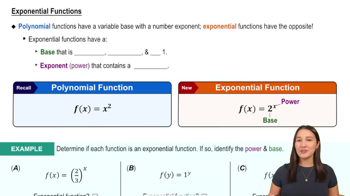Symmetry of composite functions Prove that the integrand is either even or odd. Then give the value of the integral or show how it can be simplified. Assume f and g are even functions and p and q are odd functions.
∫ᵃ₋ₐ ƒ(p(𝓍)) d𝓍
 Verified step by step guidance
Verified step by step guidance Verified video answer for a similar problem:
Verified video answer for a similar problem:



 6:37m
6:37mMaster Average Value of a Function with a bite sized video explanation from Patrick
Start learning